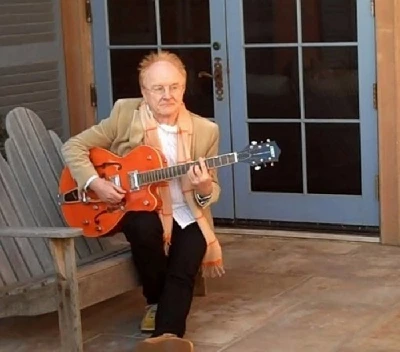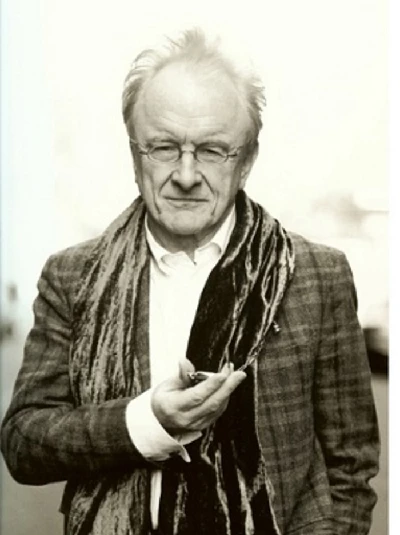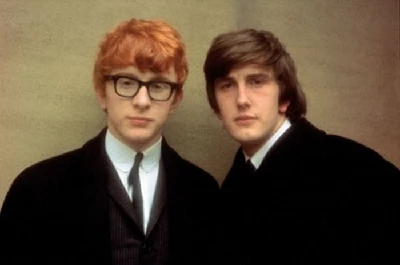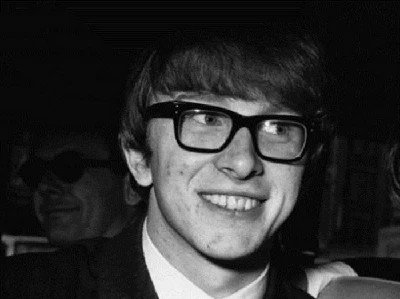published: 4 /
10 /
2011
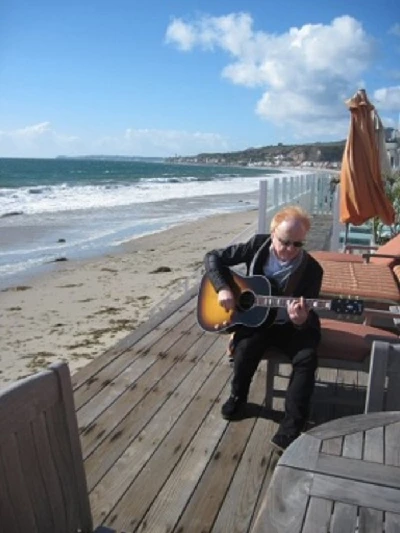
Peter Asher from 60's duo Peter and Gordon speaks to Lisa Torem about his long career as both a musician and a producer, and his new two part memoirs show
Article
I finally chased down Peter Asher at the Fest for Beatles Fans in Rosemont, Illinois, late Sunday evening – his friendly bass player had indicated with his eyebrows that Peter would pose for one more photo before he had to feverishly grab his belongings and bid his goodbyes.
The 60’s vocalist turned music mogul had spent the entire weekend signing autographs, participating in panel discussions and performing his two-part, autobiographical show for a crowd of British Invasion enthusiasts.
Asher had become part of that legacy, initially, as one-half of the “British Everly Brothers” Peter and Gordon. After meeting school mate, Gordon Waller, the two picked up stringed instruments (Asher plays guitar and banjo) and found that their voices blended magically together.
In their heyday, the lads wore button-down suits and turtle neck sweaters. Peter’s black-rimmed glass frames would later be said to inspire the cinematic secret agent Austin Powers. Gordon’s stage mannerisms and profile would remind many of John Lennon. But, besides all of that, their harmonies were consistently angelic.
One song, in particular, inspired empathy from coming-of-age girls. “I don’t care what they say/I won’t stay in a world without love”, the duo proclaimed to their screaming fans. Their world was in the process of a youthful revolution and this song hit the mark.
Their 1964 hit, ‘A World Without Love’ had been written by Paul McCartney – he and Asher had met because Paul had been dating Jane, Peter’s sister - who had spent many hours composing in the Asher’s middle-class London home.
Paul McCartney also penned ‘Nobody I Know’, ‘I Don’t Want to See You Again’ and ‘Woman.’ The last had been sneakily published under the name Bernard Webb – Paul had used the pseudonym to see if he could score a hit purely because of his talent, and not because of his name. That “rose by any other name” was still sweet. ‘Woman’ climbed the charts, though it reached #14, not #1.
.
Peter and Gordon’s performances also introduced audiences to writers such as Del Shannon (‘I Go to Pieces’) and excited Buddy Holly fans with their version of ‘True Love Ways.’
After Peter and Gordon’s eventual breakup, near the end of the 1960s, Asher headed A & R for Apple Records, and relocated to California to manage and produce acts such as James Taylor, Linda Ronstadt, Cher and Neil Diamond.
After 37 years, Peter and Gordon reunited at a benefit for the Dave Clark Five’s keyboardist, Mike Smith. They continued performing their classic repertoire until Waller’s death two years ago.
As always, Peter Asher has his fingers in many unique pots. To commemorate what would have been Buddy Holly’s 75th birthday, he has, along with Songmasters, produced a tribute album which not only received blessings from Maria Elena Holly, the late songwriter’s widow – Holly died in a plane crash when he was only 22 - but features Holly songs interpreted by a cross-section of artists from several, normally unrelated genres.
Although Paul McCartney couldn’t be persuaded to participate – He had already committed himself to ‘Rave On Buddy Holly’, another tribute project – Asher did manage to get the other surviving Beatle, Ringo Starr, to put a salty spin on ‘Think It Over’. Other artists who participated in the recording project include: Brian Wilson, rockabilly queen Imelda May, Lyle Lovett and Victoria Asher, who sung ‘Peggy Sue.’
Speaking by phone, the crisp, musicality of Asher’s tone becomes more and more pronounced. He speaks the way a singer sings; using expressive, measured phrases. But, his voice also conveys a take-charge confidence.
It is clear that his years of experience as a performer and as a manager and producer have made him, not only an acclaimed singer of bittersweet, air-tight harmonies, but one who makes tough, artistic choices without regret.
PB: You have been doing with your band a two part multimedia show, ‘A Musical Memoir of the ‘60s and Beyond’ about your life as a member of Peter and Gordon and as a producer and head of your own management company. The show has already appeared on both American coasts, and premiered in London. How did you come up with the idea for this revue and where else will it be performed?
PA: The basic story is that Gordon and I took 37 years off and then got back together to do a few other shows. And, during that time, I enjoyed doing those shows and the audience seemed to like it.
What I realized is that they liked hearing the songs, but they also liked hearing the stories and stuff. Gordon was less into that – “We can’t get them bored” - but I liked telling stories on stage.
In the meantime, I have also been asked to do, quite often, lectures and keynote speeches and addresses and I’ve written some bits and pieces for that purpose. Following Gordon’s death, I realized that I would never get to sing those songs with him again, obviously,
I thought that there might be a way to sing some of the songs, but combine it with the story telling and the lecturing. Of course, when you do lectures now, it automatically involves multi-media stuff.
If you stand up at a lectern, people expect photos and videos. It would have been tough to say that I could never sing those songs again without Gordon. So I decided to see if I could put something together finding a way of dealing with the songs that, so noticeably, Gordon led.
I did it experimentally and it went very well. I’ve done it in London and I’ll do it pretty much anywhere nice where someone asks me to do it - where I can play and where it makes economic sense. – and doesn’t lose money . It’s fun to do and I enjoy it.
PB: You were executive producer of the ‘Listen to Me’ series and Buddy Holly recording project. How did you enlist such a diverse roster of artists?
PA: There’s a different story behind each one. Songmasters put it together. They do a lot of charitable work and I’ve admired what they’ve done in the past. They asked me if I wanted to produce this thing and be involved in putting it together and I said yes.
Each artist had a different story. Obviously, some people said they couldn’t do it and some said they weren’t interested and that they were not particularly huge Buddy Holly fans. It varied enormously.
Stevie Nicks was the first to commit and she did ‘Not Fade Away.’ Stevie was an old friend and it was relatively easy to ask her because she fancied singing it. I co-produced that one with Waddy Wachtel, a brilliant guitarist and great friend of mine, who is Stevie’s musical director.
The last one to commit was Zoe Deschanel. I had always liked her singing on the ‘She and Him’ records. I liked her voice a lot and I knew that she and I were both Linda Ronstadt fans. We had that in common, because I’d read that about her.
I got to ask her because I ran into her in my house (laughs). She was at a party that my daughter, Victoria, was having at our house in Malibu. My wife told me she was there and I said, “Oh great, I’ll introduce myself.” So we met and she was the last one.
But each act is a different story.
PB: I wanted to talk about artists that you’ve chosen to manage and produce. You just mentioned Linda Ronstadt. With Linda, you produced an album a year from 1975-1978. The covers on those albums included songs written by Roy Orbison, Chuck Berry, Warren Zevon and James Taylor. How did you select these covers?
PA: Linda chose a lot of those herself. She’s terrific at song choosing. There were some of my suggestions and some of hers. They were just songs we loved. There were some that were well-known and some not known at all. I mean Warren Zevon was pretty obscure at the time. Indeed Linda played a major role in bringing him to prominence.
I think it was Jackson Browne who originally turned us both on to Warren. And, then Linda loved the songs, certainly some of the great ones like: ‘Heart like a Wheel’. Another discovery – I didn’t know about the McGarrigles, but Linda did. The only basis was that Linda loved them and that she could sing them well. But, she could sing pretty much anything well, so there’s not that much of a distinction.
PB: What was your relationship like with Linda on a professional level? She had not been satisfied with producers that had come before you.
PA: Evidently not. She’s written about that, quite extensively. We respected each other’s views and we found each other good people to bounce ideas off of. It was certainly a collaboration – we worked very well together.
PB: In regards to your relationship with James Taylor – you really took a risk in that he was still an unknown artist when you brought him to America. Do you think producers and managers are willing to take similar risks these days?
PA: Oh, yes. You run into people who gamble everything on an artist they believe in. Of course, nine times out of ten, the gamble doesn’t succeed. I was lucky that I had the right person. My beliefs were well-justified, but people do it certainly.
Yes, I was gambling. On the other hand, I was relatively young – I wasn’t gambling a lot. I was gambling the next couple of years of my future – whether I would starve or not (Laughs). But, one can do those things when one doesn’t have wives and children and that sort of thing, and when you believe in something that makes it worth taking a risk.
Bu, it was exciting and, yes, I was doing it because I believed in James, but I wanted to be in America – I loved America. That was where my future or the future would probably lie. But it all made sense. It’s not like I went to the African jungle or something.
PB: Was there a particular James Taylor tune that jumped out at you – that made you say that “I’ve just got to work with this man?”
PA: Well, out of the songs I initially heard: ‘Something in the Way She Moves.’ It was a song about his sister, Kate, actually. It was a beautiful song. (Asher had also managed and produced Kate Taylor’s 1971 debut ‘Sister Kate’. She is Taylor’s younger sister-LT.) On his demo tape; there was ‘Something’s Wrong’, ‘Knocking around the Zoo’ and ‘Something in the Way She Moves’ was on there, too. I’m not sure about anything else.
PB: Peter, you produced the ‘Live at the Troubadour’ album more recently. How did you decide how Carole King and James Taylor would divide up the solos and harmonies and whose songs you would feature?
PA: We tried to keep the set list to very much what it would have been then. When James first asked me to help put that together, it was very much intended as a recreation of the gig in 1972.
The big difference being that in 1972, Carole was just a band member. In other words, she had never performed in public. She was a songwriter whose piano playing we loved and I asked her to be part of the recording team for the album.
So Carole played on the record and when we did ‘The Troubadour’, I put the same, exact band together as the record –except, by that time, we had found Lee Sklar who was not on the record, because we hadn’t found him, but Russ Kunkel, Danny Kotchmar and Carole all played on the record… .
But, back in the 1972 gig, we prevailed upon Carole – we said, look, nobody knows you’ve written all of these amazing songs. Why don’t you do twenty minutes or half-an-hour before James, in the show – which she agreed to do. To my knowledge, that was her first, public performance.
And she did, of course, some of her classic songs and some of the songs that she was just in the process of writing for her own solo album, which she was about to make, which ended up being ‘Tapestry’, So that was the difference.
So, when we re-put it together, we decided, clearly, to mix-up James and Carole’s tunes into one show – where they would kind of alternate. In terms of how we put that together, we just wrote down all the songs and jiggled the set list around until it looked right, like we usually do.
PB: You’ve also worked with the Webb Sisters. ‘Baroque Thoughts’ is really a beautiful song that seems to have been drawn from the classical realm.
PA: It’s one of their best songs. The very first time that they played it to me was in my living room in my flat in London. Of the key songs that they’ve written, that’s one of my favourites and one of the audiences’ favourites. It didn’t take much choosing – it’s a good one. That’s one of the first ones that they played for me and we always assumed it would be on the record.
PB: What do you look for in an act and in a singer? Linda Ronstadt had an attraction to opera. The Webb Sisters feature the harp. There are some unusual traits in the acts you choose.
PA: I suppose. Most of the singers in my production hat – I look for a unique kind of voice, not only in the physical sense, but a unique way of saying things – but, most of the singers I’ve worked with, I think, end up being the ones where they sing a few notes and you know who it is.
The singers that I really don’t like are the ones who go, “Please release my record. I can sing anything. Tell me how you want me to sing.” The super-flexible, theatrical kinds of singers – whereas when it’s Linda or Diana Ross or Cher or Natalie Merchant or all of the people I’ve worked with, usually it’s “That’s Diana Ross. That’s how she sings.”
It’s the same with Linda, and the same with Cher, They’re all completely different. I like that. I like singers with a real identity.
PB: When you look back at the early days of Peter and Gordon, you covered songs by Del Shannon and, of course, Paul McCartney. There was another cover by Mike Leander, ‘Lady Godiva.’. I read that it was banned in Coventry.
PA: The mayor of Coventry said it was insulting to his city, or something.
PB: Have they forgiven you?
PA: (Laughs) I feel fairly confident that they wouldn’t remember. I don’t know if some record company press hack dreamed that one up or if it was real. I read it -kind of like you read it. No, we were never handcuffed.
: .
PB: But what kinds of songs lent themselves well to the sound of Peter and Gordon?
PA: Just good songs that we thought we could sing well – songs that gave themselves to two-part harmonies that we liked. Sometimes we covered some American records. We did ‘Baby, I’m Yours’ because I loved the original Barbara Lewis record, and it was never a hit in England, so I said we could do that, and that was a hit in the UK.
‘Lady Godiva’ - I was less enthusiastic about. But, Gordon talked me into it. I thought it was a stupid, novelty record. But, in the end, it was a big hit,, so he was right.
PB: Did you and Gordon have a consistent way of working out the harmonies?
PA: I pretty much worked around him and he would make suggestions – but, generally he was singing the melody and I would figure out the harmony. It’s not brain surgery. 90% of it is just thirds –like the Everly Brothers and everybody else.
PB: Peter, you were once a partner in the Indica Gallery where so many events that affected popular culture took place. What were your memories of John and Yoko and that era?
PA: That’s a big question. There are a lot of memories – some of them quite hazy, but we opened the book shop first. Paul McCartney was very involved in helping us with the book shop. Jane would come and help; Paul would come and help and put the shelves up.
Then we opened up the art gallery. Paul actually drew the map for the flyer we used to tell people where the art gallery was – he was quite good at graphic stuff. When we were first putting the exhibition together, I don’t think she was the first, but one of the exhibitions we had heard about was Yoko and her conceptual art, so we contacted her and booked her for one of the first exhibitions.
Obviously, we invited our usual invitation list which included the Beatles, because they were friends of mine, and that’s how John came to the opening and met Yoko, and I remember that occasion, of course, because I was there.
PB: Was there competition between you and Paul McCartney in terms of the songwriting and performance?
PA: No, are you kidding? I’m a very mediocre songwriter of limited achievements and he’s the best in the world. Competition? I should be so lucky.
PB: Paul was very pleased that Peter and Gordon achieved success with his songs?
PA: Oh, yes, because ‘A World Without Love’ was, obviously, an orphan song that we rescued. I mean, nobody was going to do it, I don’t think, because it didn’t have a bridge and John didn’t want to do it.
Billy Jay Kramer turned it down. It was just sitting there and after that was a hit, Paul wrote, ‘Nobody I Know’, for example, specifically for us in order to have a follow-up in traditional, songwriting style. So, no, he was very happy. Songwriters like having hits.
PB: How much was your daughter Victoria influenced by growing up in your musical home? Did you encourage her to pursue music? Your mother was a musician.
PA: No, I didn’t try to encourage her to go into music. We did try to get her to take piano lessons. She was kind of like me – too lazy to do it properly, but she learned enough to obviously get by on the keyboards. (Victoria currently plays keytar in the band, Cobra Starship).
Victoria is a very good, instinctive player, but neither of us are properly trained, so yes, my wife particularly would nag her to take piano lessons, just like my mum would nag me – but, beyond that, encourage her to go into music as a career, no. That was kind of a surprise move on her part.
PB Your sisters were actors.
PA: My sister Claire dabbled in it, but she was never really an actress. She was the cleverest one of all of us. She became a school teacher and then a school inspector. She’s the brainy one, the brainiest.
PB: You were a child actor –
PA: And so was Jane.
PB: And, at what point did you switch over to music?
PA: My childhood acting career drifted to an end when school got serious, probably when I was about fourteen. I started when I was eight. I was at Westminster which is a really tough school – they won’t give you time off for anything. Whatever acting opportunities there were, I mostly missed them.
And, of course, I started playing guitar and singing and stuff – my pop music venture began at school when I met Gordon and we started singing in public, and eventually that turned into a career. For several years, we just did it for the fun of it.
PB: Do you think that you’ll write a formal biography?
PA: No.
PB: You’re more comfortable with the show –
PA: Oooh. Everyone’s written a bloody book – particularly from the Beatles’ era. Practically everyone who writes the book (says)– “I was really the fifth Beatle.” “I told Paul…”…
They are mostly full of mistakes and a bit dreary. Obviously, there are some good ones, too, but I decided not to join that list because only the Beatles themselves and probably Jane and I are the people who haven’t written a book (laughs).
Otherwise, if you were the Beatles driver, photographer, make up artist, let alone girlfriend – they’ve all written books - and I just don’t want to. Whereas with the lecture thing, it’s fun because I can change it and if somebody says something’s wrong, I can go, “Oh, okay, I’ll change it.”
With the book you’re actually going, “This is the way it was.” My book would have as many mistakes as anybody else’s.
PB: What was the first song that you learned on guitar?
PA: Ah – good question. It might have been a skiffle song, most likely. It might have been, ‘Don’t You Rock Me, Daddy-o’ which was the Vipers’ skiffle hit. I remember learning that off the record – it’s only three chords. Or it might have been a ukulele song that my father might have taught me. He played the ukulele, as well as piano. It’s somewhere in there.
PB: And you sang that song as well?
PA: Yeah.
PB: What was your first guitar?
PA: I don’t remember the brand name. It was very cheap. I don’t know what it was, but I remember it. Wooden, six-string, a pale wood with a tail piece, and I have no idea what brand it was, but my parents got it for me.
PB: Peter, who would you say were your essential musical influences?
PA: When I very first started playing, probably American folk music, Woody Guthrie. I learned all of the Woody Guthrie songs.
PB: Would you change anything that has happened in all of these years?
PA: No.
PB: You wouldn’t?
PA: And, I’m not sure that’s a fruitful exercise, you know? So, it’s like, no, I don’t think I would.
PB: Would you have any advice for somebody going into the business right now?
PA: You used to be able to go into the music business thinking that you might get rich and famous – now, you might get famous (Laughs). But, it’s incredibly unlikely that you’ll get rich because the whole industry has changed so massively. It’s only worth going into if you feel inevitably drawn to it. If you feel fascinated by the music itself and love the music. Going into it for any other reason is probably a losing proposition.
PB: Are there any literary works that have inspired you?
PA: Yes, but, inspired me? I don’t know. I read a lot and I love reading. But, as far as inspiration, no, but I tend to read Martin Amis or Will Self, people who are, in many ways, totally uninspiring (laughs) because they’re cynical and depressed. They’re not inspiring in the sense of providing any positive messages.
PB: How important are words as opposed to music in terms of being a producer?
PA: In terms of songs, to me, honestly, not so much. I listen to the music first, big time and the words dawn on me later on. Certainly, words are important to me in the sense that I prize language and read a lot and write quite a lot and value the significance and value of good prose. But, song lyrics, I tend to figure out what the song is actually about later, (Laughs) after I fall in love with the song.
PB: So falling in love with the song would be the major thread?
PA: Yes, and that would be primarily based on music, and eventually I would figure out what the lyrics are about maybe.
. . .
PB: Thank you.
Picture Gallery:-
